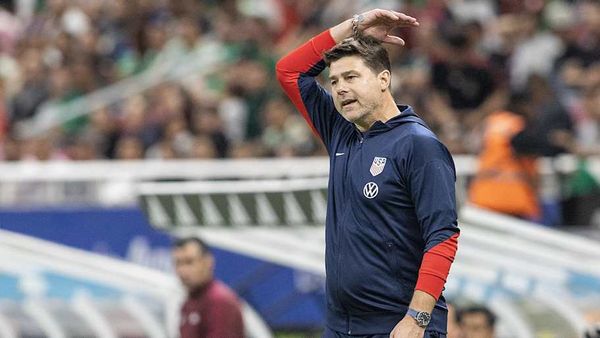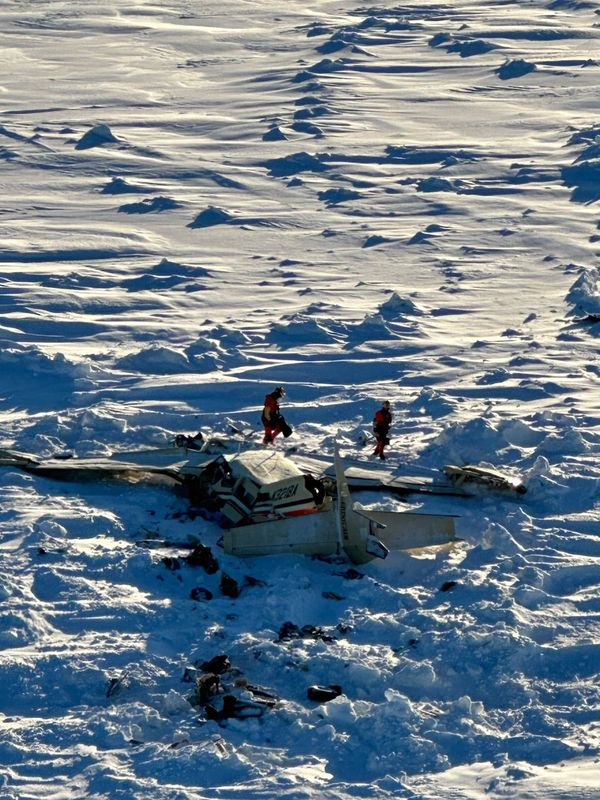At a time of deep uncertainty, when seemingly endless news alerts warn of more COVID cases, lockdowns and hardship, Mikey Webb has become a familiar face across Australia.
The Auslan interpreter has fronted hundreds of press conferences with Queensland authorities since the coronavirus pandemic changed everyone's lives in 2020.
The eldest of two brothers from Adelaide, Mikey grew up with deaf parents, grandparents, aunts and uncles.
He described a happy childhood immersed in both sign language and English.
"I'm very blessed to have had the life I had … Mum and Dad both being so prominent in the community, I've got such a big extended family of deaf community members," he said.
His path to becoming an interpreter began when he went to a World Federation of the Deaf congress in Brisbane in 1999.
"And that was the first time that I went 'this interpreting thing is amazing'," Mikey said.
'My life is so much richer for it'
Sporadic gigs at natural disaster media conferences followed, until the ongoing disaster of COVID-19 became "all encompassing".
Such visibility means he's recognised in public by both people who can hear and those who are deaf.
"People come up and you sort of get the sideways glance," Mikey said.
He's fine with the attention if it raises awareness about the need for information to be conveyed in Auslan.
"The hearing community are now starting to go, 'well hang on, there are access needs out there'," he said.
"If you're not there [at a media conference] they're asking 'why?', which I think is amazing.
Mikey said being part of the deaf community made his life "so much richer".
From rock 'n' roll to COVID
Public affection for the interpreter with the "man bun" and vast array of suits deepened when vision emerged of him rocking out on stage as he danced and signed AC/DC lyrics.
It was part of his work with Auslan Stage Left, a group which provides interpreters so deaf people can have access to theatre and the arts.
"That stuff is amazing. I love doing that sort of stuff. It's who I am, I'm very flamboyant in that regard," he said.
"Watching deaf people come to a concert — something that they've never really had access to before — and going along with their families, their friends, their neighbours, their community and they're enjoying the spectacle that's being put on with everybody else, that's what gets me going."
Mikey described Auslan as a "3D spatial language."
"The facial expressions come in as tone and seriousness or joviality, whatever it might be, so there's that whole stuff going on," he said.
Mikey has been missing from TV screens across the nation in the past few days after he was identified as a close contact of a COVID-infected person amid south-east Queensland's current Delta outbreak.
The state's Chief Health Officer Jeannette Young confirmed Mikey was quarantining at home and had so far returned a negative test result.
"He is not a confirmed case, he has a contact … he is fine and we will just work through if there are any risks there but I'm not concerned," Dr Young said at this morning's press conference.
'Astronomical' demand for interpreters
It is estimated there are roughly 30,000 Auslan users in Australia.
But the Chief Impact Officer with Deaf Services and the Deaf Society, Brent Phillips, said the exact figure is hard to pinpoint.
"The most recent census in 2016, there was some data in relation to the use of language at home and there was around 12,000 people who nominated Auslan," he said.
"But the issue with the census, how it was structured, didn't allow for Auslan to be identified as a main language that you speak at home."
Mr Phillips is a father of two and a third-generation deaf person, whose wife is also deaf.
He said the deaf community campaigned for a change to include Auslan as a language option, so this year's census should provide different figures.
He said with only 500 to 600 accredited interpreters in Australia, demand far exceeds availability.
"There's a growing recognition and acceptance of the obligation to provide interpreters in key settings, such as in government briefings or conferences, in workplace meetings," Mr Phillips said.
"People are starting to realise that they have an obligation to provide that access to their deaf community members.
"The National Disability Insurance Scheme is now also providing funding in deaf people's packages for interpreting and that can be for social interpreting, civic and community participation."
There are no accredited Auslan interpreters in the Northern Territory, which has meant Queensland-based Mikey was required to interpret press conferences virtually when Greater Darwin went into lockdown in June.
Mr Phillips said the presence of Auslan interpreters at emergency briefings has helped raise awareness of interpreting as a career.
"So that's a side outcome … interpreters are there to provide the deaf community with access to key information, the secondary benefit is that is does raise awareness and the profile of Auslan and interpreting as a career pathway."
Mr Phillips said the deaf community would like to see Auslan interpreters at good news stories too.
"We're trying to establish a minimum standard … whether the news is good or bad because we do have the right to access information any time in our first language, just like our peers do," he said.
He said "general acceptance" of Auslan as a national language has "stepped up" and in Victoria it is now the fifth most taught language in schools.
"So there is a lot of growth in people's understanding and appreciation and wanting to learn the language," he said.
"The future looks very positive."







